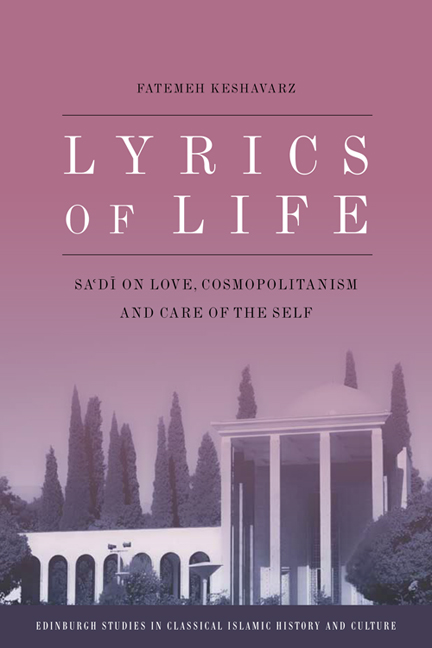Book contents
- Frontmatter
- Contents
- Acknowledgments
- 1 At the Brink of Writing: Which Doors to Open First?
- 2 Cosmopolitan Kinship: The Making of a Multi-world Subjectivity in the Poetry of Sa'di
- 3 Sa'di on Care of the Self: Ethical Games of Power in Practice of Freedom
- 4 “Every New Flower Arriving in the World”: Sa'di and the Art of Ghazal Writing
- 5 Gazing at the Garden of Your Beauty: Love in the Garden
- 6 My Poor Heart Sometimes Runs, Sometimes Whirls: Meet Sa'di the Comedian
- 7 Epilogue: Leaving the Garden Already? Here Are a Few Things I Hope You Take Along
- Bibliography
- Index
1 - At the Brink of Writing: Which Doors to Open First?
Published online by Cambridge University Press: 05 August 2016
- Frontmatter
- Contents
- Acknowledgments
- 1 At the Brink of Writing: Which Doors to Open First?
- 2 Cosmopolitan Kinship: The Making of a Multi-world Subjectivity in the Poetry of Sa'di
- 3 Sa'di on Care of the Self: Ethical Games of Power in Practice of Freedom
- 4 “Every New Flower Arriving in the World”: Sa'di and the Art of Ghazal Writing
- 5 Gazing at the Garden of Your Beauty: Love in the Garden
- 6 My Poor Heart Sometimes Runs, Sometimes Whirls: Meet Sa'di the Comedian
- 7 Epilogue: Leaving the Garden Already? Here Are a Few Things I Hope You Take Along
- Bibliography
- Index
Summary
Prelude
Call it the information superhighway of the Persian-speaking world or, more romantically, the Silk Road of the imagination connecting premodern Persian speakers. Classical Persian poetry was that and more. Indeed there are not many metaphors that do justice to the range of functions that this traveling web of spiritual, artistic and intellectual ideas performed for its readers. These included: education, entertainment, propaganda, settling personal accounts, teaching ethical principles, guiding spiritual quests, nurturing aesthetic creativity and disseminating academic learning. Through its wide geographical and intercultural reach, this poetry enabled its readers to imagine themselves as members of a community much wider than the one that surrounded them. The world had to be larger than the one in which one was born. Why else would a poet and teacher as renowned as Sa'di of Shiraz spend thirty years of his life traveling and telling his readers on different occasions, “The lands and seas are vast, and the peoples living in them numerous”? In short, for those living along this Silk Road, the readers of the poetry that acknowledged the existence of a complex world, the self was humbled in the presence of many others and subjectivity evolved naturally into intersubjectivity.
I now realize how lucky it was that this road went right through the home of my childhood, turning it, frequently, into a gathering place for the many poets who found keen listeners awaiting their arrival. They visited daily, contemporaries from our hometown Shiraz as well as those traveling all the way from thirteenth-century Khorasan (northeastern Iran). The occasions for their visits were many and varied: a moment of nostalgia, a family game based on poetry, a homework assignment, even a parental reproach embellished, as it usually was, with poetic words of wisdom. Even before I was old enough to discuss poetry, I realized that good poetry frees itself from the page and becomes a part of one's daily life.
The most playful, least intimidating and funniest poets visited more often. Those who had traveled were desirable. They had stories to tell.
- Type
- Chapter
- Information
- Lyrics of LifeSa'di on Love, Cosmopolitanism and Care of the Self, pp. 1 - 41Publisher: Edinburgh University PressPrint publication year: 2014



